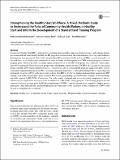| dc.contributor.author | DeAngelis, Katherine Rachel | |
| dc.contributor.author | Doré, Katelyn Flaherty | |
| dc.contributor.author | Dean, Deborah | |
| dc.contributor.author | Osterman, Paul | |
| dc.date.accessioned | 2019-03-11T15:11:31Z | |
| dc.date.available | 2019-03-11T15:11:31Z | |
| dc.date.issued | 2017-12 | |
| dc.identifier.issn | 1092-7875 | |
| dc.identifier.issn | 1573-6628 | |
| dc.identifier.uri | http://hdl.handle.net/1721.1/120853 | |
| dc.description.abstract | Introduction Healthy Start (HS) is dedicated to preventing infant mortality, improving birth outcomes, and reducing disparities in maternal and infant health. In 2014, the HS program was reenvisioned and standardization of services and workforce development were prioritized. This study examined how HS community health workers (CHW), as critical members of the workforce, serve families and communities in order to inform the development of a CHW training program to advance program goals. Methods In 2015, an online organizational survey of all 100 HS programs was conducted. Ninety-three sites (93%) responded. Three discussion groups were subsequently conducted with HS CHWs (n = 21) and two discussion groups with HS CHW trainers/supervisors (n = 14). Results Most (91%) respondent HS programs employed CHWs. Survey respondents ranked health education (90%), assessing participant needs (85%), outreach/recruitment (85%), and connecting participants to services (85%) as the most central roles to the CHW’s job. Survey findings indicated large variation in CHW training, both in the amount and content provided. Discussion group findings provided further examples of the knowledge and skills required by HS CHWs. Conclusions The study results, combined with a scan of existing competencies, led to a tailored set of competencies that serve as the foundation for a HS CHW training program. This training program has the capacity to advance strategic goals for HS by strengthening HS CHWs’ capacity nationwide to respond to complex participant needs. Other maternal and child health programs may find these results of interest as they consider how CHWs could be used to strengthen service delivery. Keywords: Healthy start; Community health worker; Infant mortality; Maternal health; social determinants of health | en_US |
| dc.publisher | Springer-Verlag | en_US |
| dc.relation.isversionof | http://dx.doi.org/10.1007/S10995-017-2377-X | en_US |
| dc.rights | Creative Commons Attribution 4.0 International license | en_US |
| dc.rights.uri | https://creativecommons.org/licenses/by/4.0/ | en_US |
| dc.source | Springer | en_US |
| dc.title | Strengthening the Healthy Start Workforce: A Mixed-Methods Study to Understand the Roles of Community Health Workers in Healthy Start and Inform the Development of a Standardized Training Program | en_US |
| dc.type | Article | en_US |
| dc.identifier.citation | DeAngelis, Katherine Rachel et al. “Strengthening the Healthy Start Workforce: A Mixed-Methods Study to Understand the Roles of Community Health Workers in Healthy Start and Inform the Development of a Standardized Training Program.” Maternal and Child Health Journal 21, S1 (November 2017): 65–74 © 2017 The Author(s) | en_US |
| dc.contributor.department | Sloan School of Management | |
| dc.contributor.mitauthor | Osterman, Paul | |
| dc.relation.journal | Maternal and Child Health Journal | en_US |
| dc.eprint.version | Final published version | en_US |
| dc.type.uri | http://purl.org/eprint/type/JournalArticle | en_US |
| eprint.status | http://purl.org/eprint/status/PeerReviewed | en_US |
| dc.date.updated | 2019-02-26T19:19:31Z | |
| dspace.orderedauthors | DeAngelis, Katherine Rachel; Doré, Katelyn Flaherty; Dean, Deborah; Osterman, Paul | en_US |
| dspace.embargo.terms | N | en_US |
| dc.identifier.orcid | https://orcid.org/0000-0002-1210-7820 | |
| mit.license | PUBLISHER_CC | en_US |
